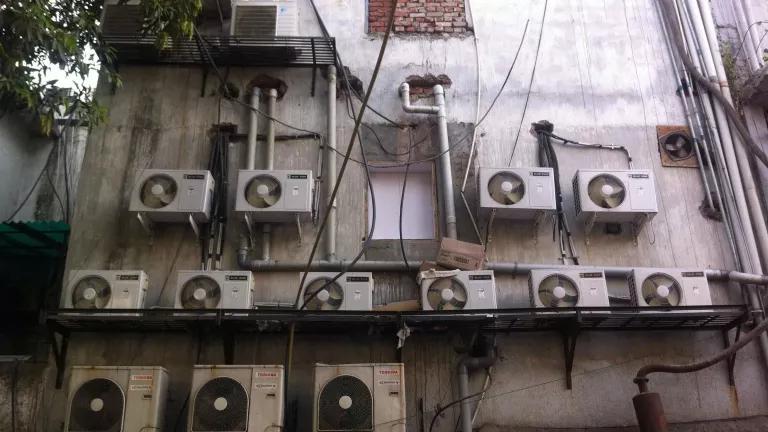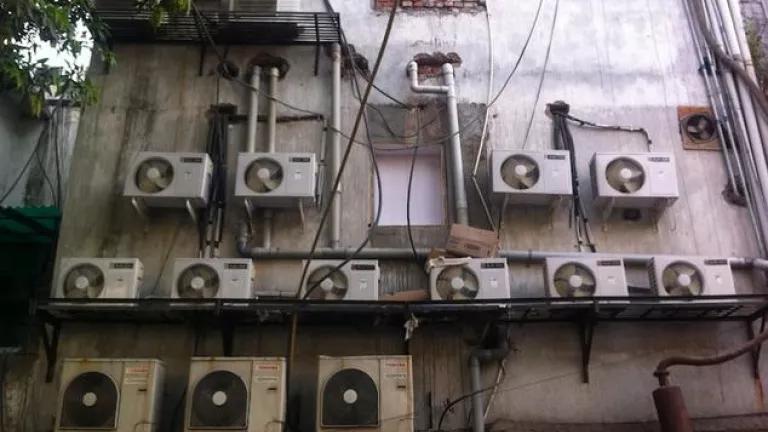India Can Help Cement Global Commitment on HFCs
This week’s Leader’s Summit on Climate is a good time for India to signal to a strong commitment to climate action by announcing its plan to ratify the Kigali Amendment, a global pact struck in 2016 which aims to phasedown harmful hydrofluorocarbons used in cooling appliances.

Air conditioners in Delhi-NCR region
Co-authored with Marie McNamara
As nations convene for the Leader’s Summit on Climate this week, it is a good time for India to announce its plans to ratify the Kigali Amendment, a global pact struck in 2016 which aims to phasedown harmful Hydrofluorocarbon (HFC) refrigerants used in cooling appliances. HFCs are on average several thousand times more potent than carbon dioxide. If fully implemented, the Kigali Amendment could prevent up to 0.5°C of global warming by the end of this century and achieve a nearly 90% reduction in global warming resulting from unconstrained HFC use.
The Kigali Amendment is already backed by 119 countries around the world. However, for the agreement to be effective, the world's highest current and potential HFC emitting countries—China, the United States, and India—must also all formally ratify it. Fortunately, there have been major developments on that front—China announced this week its decision to ratify the Kigali Amendment. The US is also taking action; within days of taking office, President Biden directed his administration to prepare to send the Kigali Amendment to the Senate for its advice and consent to U.S. ratification. And, late last year, the U.S. Congress passed the AIM Act on HFCs, a new law that will bring the U.S. into compliance with the obligations of the Kigali Amendment within a matter of months.
India has for decades played a key role in bringing about the success of the Montreal protocol, the hugely successful international environmental treaty on which the Kigali Amendment is based. India’s ratification of the Kigali Amendment would send a strong signal to the rest of world about its commitment to the treaty moving forward, encouraging other countries to ratify and signaling that a rapid global market transition is soon to begin.

India has been a leading participant in Montreal Protocol discussions
Five Reasons for India to Ratify the Kigali Amendment
- India is ready to embrace market transition. The ratification would signify that India is ready to compete in the market for climate friendly refrigerants, which will spur domestic innovation and attract international investments.
- India is earnest about climate change. India is one of the few countries on track to meet its climate commitments under the Paris Agreement. Kigali ratification, with its strong and fast action on HFCs, will further solidify this trend.
- India is committed to climate-friendly cooling for all. In a country already experiencing extreme heat waves, cooling is an absolute necessity. Ratifying the Kigali Amendment would demonstrate that India has a plan to provide much needed cooling for millions while balancing the need to protect the environment.
- India will go to Montreal Protocol from a position of strength. India’s has already established strong climate credentials from its work on the Montreal Protocol for the past several decades. Ratifying the Kigali Amendment would strengthen India’s influence and goodwill around the globe and help bolster India’s efforts to establish smart policies and bylaws, such as including energy efficiency in phasing down HFCs, and more.
- Kigali ratification would formalize the work India is doing on HFCs. India has been moving forward to implement the India Cooling Action Plan, which embodies the Kigali Amendment’s goals to phase down HFCs and reduce cooling demand. The ICAP, released in March 2019, aims to reduce refrigerant demand by 25-30% by 2037, train and certify 100,000 servicing sector technicians by 2022-23 and reduce overall demand for cooling across sectors by 20-25. Several of these interventions are already being implemented. Ratifying the Kigali Amendment would signal that India is steadfast in achieving the Montreal Protocol goals, and reaffirm India as a responsible international power, committed to increased climate ambition.
Prima Madan is an energy efficiency expert working as a consultant with NRDC's India program. Marie McNamara is a Duke Stanback Fellow with NRDC's India program.




